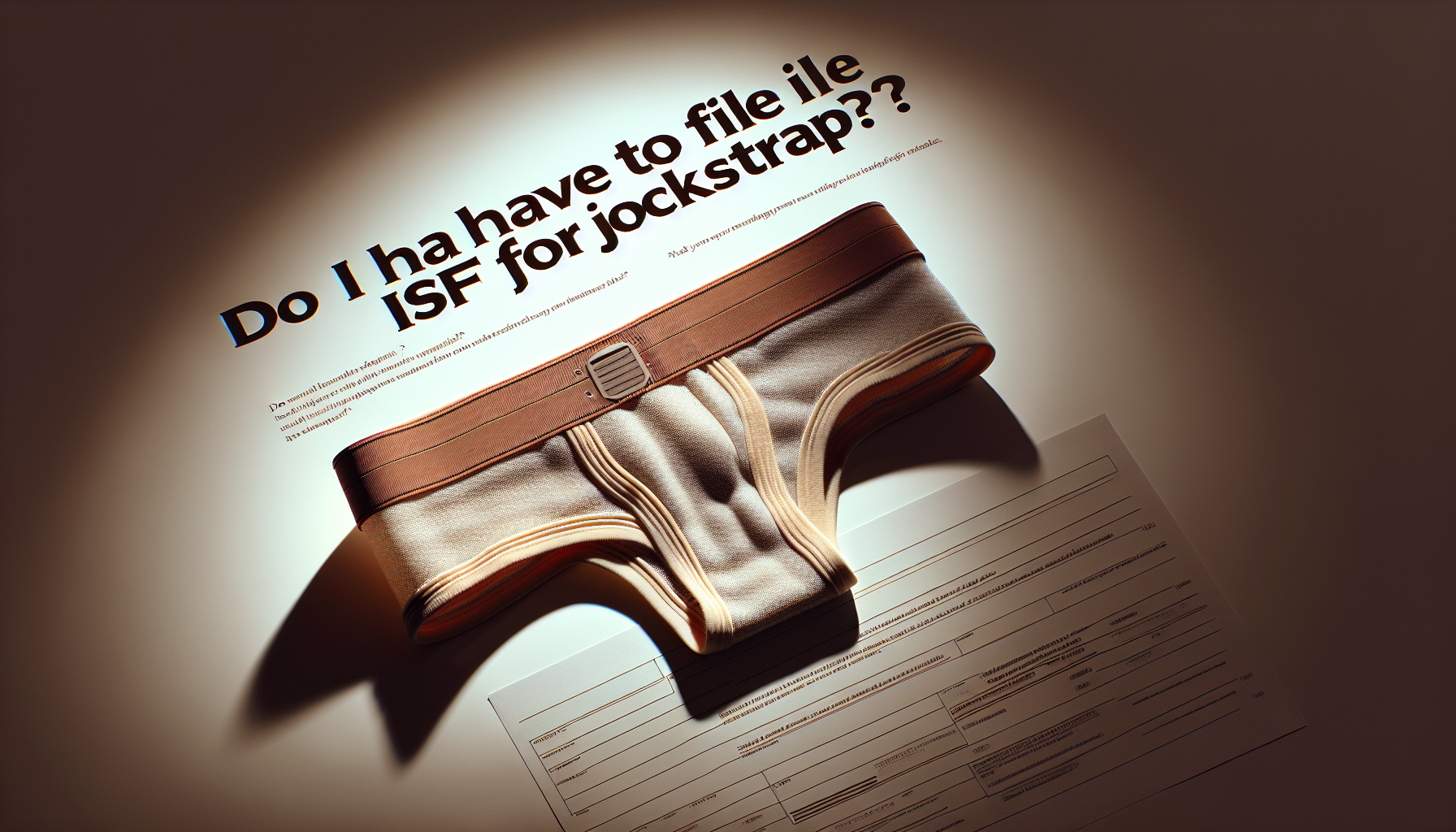Do I Have To File ISF For Jockstrap
Have you ever wondered what it means to file an ISF and whether you need to do it for something as specific as a jockstrap? You’re not alone in your curiosity. The Importer Security Filing (ISF) is a crucial aspect of international shipping that can sometimes feel overwhelming, especially when it comes to specific products.

Understanding ISF
The Importer Security Filing is a requirement imposed by U.S. Customs and Border Protection (CBP). This regulation mandates that specific information regarding cargo destined for the United States is submitted before the cargo is loaded onto the ship. Think of it as a preliminary check to ensure that everything is in order before your goods even leave their port of origin.
The ISF must be filed at least 24 hours before the shipment is loaded, which is essential to help the authorities assess and mitigate any potential risks associated with the cargo. Failing to file your ISF or providing incomplete information can lead to delays, fines, or even cargo seizure. Knowing whether you need to file an ISF for a particular item, such as a jockstrap, is vital for a smooth shipping experience.
Do I Have To File ISF For Jockstrap?
You may be wondering if a jockstrap falls under the category of items that require ISF filing. Generally, any product that is shipped into the United States is subject to the ISF requirement. This includes clothing and personal items like a jockstrap. Since the jockstrap is classified as a textile product, it does indeed require you to file an ISF.
What Information Is Required for ISF Filing?
If you need to file an ISF for your jockstrap, here’s what you’ll typically need:
- Seller’s Name and Address: This includes the name and address of the manufacturer or exporter.
- Buyer’s Name and Address: This should be the consignee in the United States.
- Ship To Name and Address: If this is different from the buyer, you need to provide this information.
- Container Stuffing Location: Where the cargo is packed.
- Consolidator’s Name and Address: If applicable.
- Importer of Record Number: Your business identification in the U.S.
- Shipping Method: Indicate how the shipment is arriving (e.g., ocean freight).
- Description of Goods: This includes a detailed description of the shipment, such as “elastic jockstrap.”
Why Is ISF Important?
Filing your ISF, particularly for items like clothing or sports gear, helps ensure that your shipment travels smoothly across borders. It acts as a preventive measure against illegal smuggling and ensures that all necessary duties and taxes are accounted for. Additionally, by maintaining compliance with the regulations, you can avoid unexpected costs and roadblocks in your shipping process.
ISF Filing Process
Navigating the ISF filing process can be a bit tricky, but understanding the steps involved can make it easier for you. Here’s how to go about filing for a jockstrap:
Step 1: Gather Your Information
Before filing your ISF, collect all necessary documents and information related to your shipment. This includes the details mentioned earlier, such as the seller and buyer addresses.
Step 2: Choose Your Filing Method
You can file your ISF through various methods:
- Self-Filing: You can do it yourself if you possess the necessary knowledge and tools.
- Freight Forwarder: Many businesses opt to hire freight forwarders who specialize in ISF filing.
- Customs Broker: Using a licensed customs broker can streamline the process, as they handle all the paperwork on your behalf.
Step 3: Submit Your Filing
Once you have all the information and have chosen a filing method, it’s time to submit your ISF. Ensure that you do so at least 24 hours before your goods are loaded onto the vessel.
Step 4: Confirm Filing
You will receive a confirmation once your ISF is successfully filed. Keep this document for your records. It’s essential to have proof of your filing in case any issues arise during shipping.

Potential Consequences of Not Filing ISF
Not filing an ISF for your jockstrap or any other item can result in several repercussions. They may include:
- Fines: If you fail to file your ISF, you could face significant fines from CBP.
- Cargo Delays: Lack of an ISF can lead to your cargo being delayed at customs, causing inconvenience.
- Increased Costs: Delays can increase shipping costs, as additional fees might accrue while your cargo waits for clearance.
It’s clear that proactively filing your ISF can save you from a host of headaches down the line.
Important Services You Should Consider
To make the ISF filing process smoother, there are services you might consider:
ISF Filing
Hiring a professional for ISF filing can significantly ease your workload and ensure that everything is submitted correctly. They are experienced in ensuring all documentation is complete and that all aspects of your shipment comply with regulations.
Customs Clearance
Once your jockstrap arrives in the U.S., customs clearance is the next step. This process determines whether your goods can enter the country. A customs broker can assist in navigating the complex rules and regulations involved in clearing your shipment.
Customs Bond
If you frequently import goods, a customs bond may be beneficial. This bond serves as a safety net, ensuring that you meet your obligations to customs. A customs bond guarantees that any duties or penalties are paid, protecting both you and the customs authorities.
Best Practices for Filing ISF
To help you ensure a smooth experience, here are some best practices you might follow when filing ISF:
- Double-Check Information: Always verify that the information you provide is accurate and complete.
- File Early: Aim to file your ISF as early as possible to account for any unforeseen issues.
- Keep Detailed Records: Maintain records of all your ISF filings and related documentation for future reference.
- Stay Informed: Regulations surrounding ISF and customs can change. Keep yourself updated on any new requirements.
Common Misconceptions About ISF Filing
There are several myths surrounding ISF filing, particularly regarding specific items. Here are some clarified facts to counteract common misconceptions:
“I Don’t Need to File for Every Item.”
This is not true. Almost all imported goods into the United States, including clothing like jockstraps, are subject to ISF filing.
“ISF is Only for Large Shipments.”
Whether you’re importing one garment or a container full, if it enters the U.S., it requires an ISF filing. Small shipments are no exception.
“Filing ISF Takes Too Much Time.”
While it may seem daunting, especially for beginners, the ISF filing process can be efficient with the right tools and resources in place.
Final Thoughts
So, do you have to file an ISF for a jockstrap? The simple answer is yes! Ensuring that you comply with ISF regulations is not just about avoiding penalties; it’s about making sure your product arrives safely and without delay.
While the process may feel overwhelming, breaking it down into manageable steps can help. Consider utilizing helpful services such as ISF Filing, Customs Clearance, and Customs Bonds to make your shipping process smoother.
By staying informed and prepared, you can navigate your shipping journey with confidence. If you need assistance or have further questions about ISF filings or import processes, remember that professional help is always available.
Schedule a Free Import Consulting Call
If you want to discuss your ISF filing needs or any other import-related concerns, consider scheduling a free consulting call. It’s a great way to get tailored advice for your unique situation and ensure that you’re fully equipped to handle your shipping needs.
